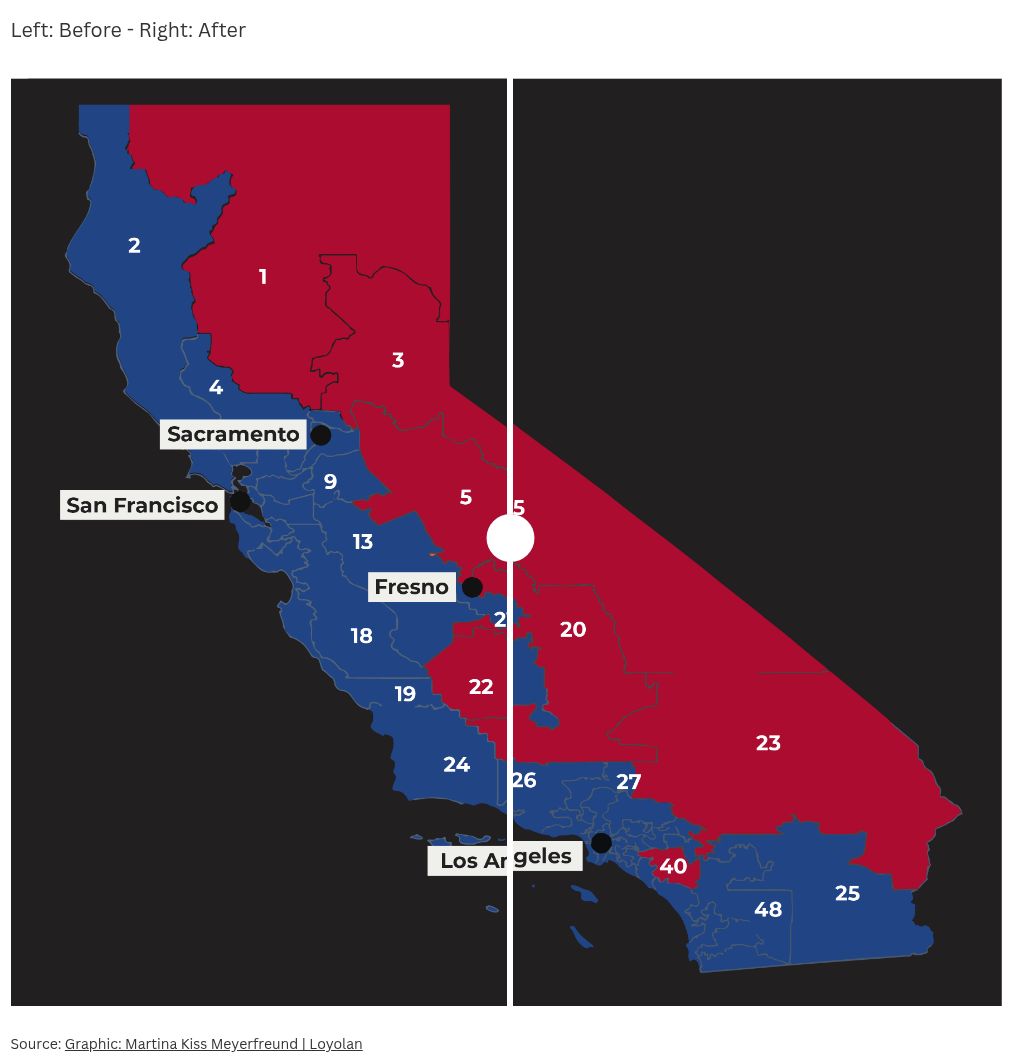
California voters received a special election ballot this month in the mail with a single, poignant question: Should California authorize temporary changes to California congressional district maps in response to Texas’ partisan redistricting?
“That becomes an ethical question for a democrat who favors good government. Should I accept this temporary getting rid of fairly drawn lines, because what the Republicans and Trump are doing is so wrong, that you have to combat it?” said Richard Fox, Ph.D., professor of political science and dean of the Bellarmine College of Liberal Arts (BCLA).
Since the passing of Proposition 11 in 2008, California has had an independent citizen-led group, the California Citizens Redistricting Commission (CRC), responsible for drawing new district lines. In 2010, the CRC gained the added responsibility of drawing Congressional districts, which controls how many seats California has in the House of Representatives, and which areas of the state those districts make up. In doing so they took the power of redistricting away from legislative bodies, and instead put it in the hands of citizens. Other states like New York, Colorado and Montana followed suit.
“Citizens in a bunch of states have decided that they trust themselves more than they trust incumbent politicians. They want to be in control of deciding which politicians to elect rather than the other way around,” said Justin Levitt, professor of law at Loyola Law School and founder of All About Redistricting.
Independent commissions are one of the facets of the Californian government that make me proud of being from this state. It shows that we value people over political parties. This furtherance of democracy remains unknown to states like Texas where drawing district maps is a choice made by legislators. This creates the opportunity for political power grabs as seen by the proposed maps from the State Legislature in Texas, which would add five new Republican leaning districts ahead of the 2026 midterms. These districts do not reflect the population of Texas and were created very explicitly for Republican political gain. It puts power in the hands of politicians and lets them control who gets elected to represent Texans.
Proposition 50 directly combats this through the creation of Democrat leaning districts, but it suspends the CRC’s ability to enact congressional district maps until 2031. Through compromising the integrity of our state’s democratic processes, Proposition 50 prevents a greater national threat of an undemocratic takeover. The increasing political polarization in this country has created an environment where partisan identities threaten the checks and balances of our country’s constitution. Yet, Proposition 50, at a state level, reflects the same behavior as those who threaten democracy.
“It’s gerrymandering, that’s what it is, and it’s plain and simple trying to give the government the power to change districts,” said Elizabeth Leka, a journalism major. “I understand that it’s to gain power in the House … I just don’t understand because it makes us as bad as them.”
Gerrymandering is the term used to describe the unconstitutional manipulation of congressional and state districts to favor one’s party. Despite it being unconstitutional and thus unlawful, a 2019 Supreme Court Case made it impossible to combat gerrymandering beyond a state level. The Supreme Court deemed that political gerrymandering could not be subject to Federal Court review, which left redistricting unsupervised in the hands of states.
“They blocked federal courts from hearing cases about partisan gerrymandering … and the real unfortunate thing, it’s part of what happens when the rule of law breaks down, people turn to self-help,” said Levitt. “Texas has decided to violate the Constitution and there are no adults in the room to stop them. I can understand California voters choosing to decide that they want to violate the Constitution, too. ”
The idea of fighting fire with fire has garnered a mixed response from voters with a current lean towards supporting the measure. According to recent polling from the firm co/efficient, 54% of Californians support the measure, while 36% oppose it and the remaining 10% are undecided. The lack of alternatives to combating gerrymandering on a national scale leaves Californians like myself desperate to take action.
“I think the fact that Texas redrew their districts to fit the agenda of the Republicans even though they already have the majority in the House and Senate and the president is a Republican is pretty dirty,” said Gabriella Gutierrez, a film and television production and Spanish double major. “Also, the fact that Texans didn’t get to vote on whether they wanted this to happen, I think, is unconstitutional.”
The key difference between California’s governmental power and Texas’ power is that it comes with an expiration date. The usage of the California proposed map ends in 2031 and power returns to our independent commission, while Texas keeps power over its people.
Photo via Creative Commons
The beauty of Proposition 50 is that the decision is still in the hands of the Californians. We can vote yes or no; the choice is not being made for us by legislatures. We live in a state where we, the people, have the power. The question becomes whether you are concerned about our political representation more at a state level or a national one. We unfortunately have to sacrifice one to protect the other. I trust my state’s ability to govern fairly more than our nation’s, which is why I will be voting for Proposition 50 and I encourage others to do the same.
While some may argue that the proposition sets a precedent of gerrymandering and unconstitutional action, the national threat of a political takeover looms over us. We cannot afford to lose fair representation at a country-wide level so we have to make certain concessions as a state.
This is the opinion of Athena Cheris, a senior film production major from San Francisco, Calif. Email comments to editor@theloyolan.com. Follow and tweet comments to @LALoyolan on Twitter, and like the Loyolan on Facebook.

